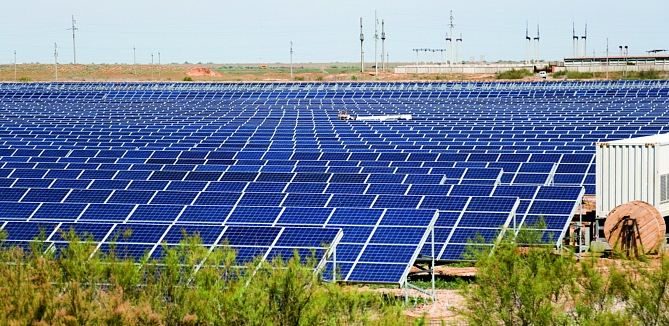Russian PV developer and solar module manufacturer Solar Systems LLC has completed construction of a 75 MW project in Novokuybyshevsk, in the Samara oblast of southwestern Russia.
According to a press release issued by the regional government, a first phase of construction started in October with a second stage two months later.
The solar plant, Russia’s largest operational PV project, was built for around RUB9.4 billion ($141 million) and mostly financed by Russian state-owned financial services provider PJSC Sberbank, which contributed RUB7.4 billion.
The project is part of a Solar Systems pipeline which includes the 100 MW Staromaryevskaya PV project and a 15 MW facility in Volodarsky, in the Astrakhan region of southwestern Russia. All three projects were allocated in Russia’s renewable energy auction of 2016.
Chinese owned
Solar Systems is a unit of Chinese PV plant operator Amus Sirius, itself a subsidiary of Harbin Electric Company Limited, a Chinese provider of electric power generation equipment. Solar Systems owns a 100 MW monocrystalline silicon solar panel factory in a special economic zone in the Yelabuga municipal district of the Republic of Tatarstan.
Solar parks that use Russian materials receive higher feed-in tariffs than projects using components fully manufactured abroad.
Russia had an installed solar power capacity of around 546 MW at the end of last year, according to figures from the International Renewable Energy Agency.
This content is protected by copyright and may not be reused. If you want to cooperate with us and would like to reuse some of our content, please contact: editors@pv-magazine.com.




By submitting this form you agree to pv magazine using your data for the purposes of publishing your comment.
Your personal data will only be disclosed or otherwise transmitted to third parties for the purposes of spam filtering or if this is necessary for technical maintenance of the website. Any other transfer to third parties will not take place unless this is justified on the basis of applicable data protection regulations or if pv magazine is legally obliged to do so.
You may revoke this consent at any time with effect for the future, in which case your personal data will be deleted immediately. Otherwise, your data will be deleted if pv magazine has processed your request or the purpose of data storage is fulfilled.
Further information on data privacy can be found in our Data Protection Policy.